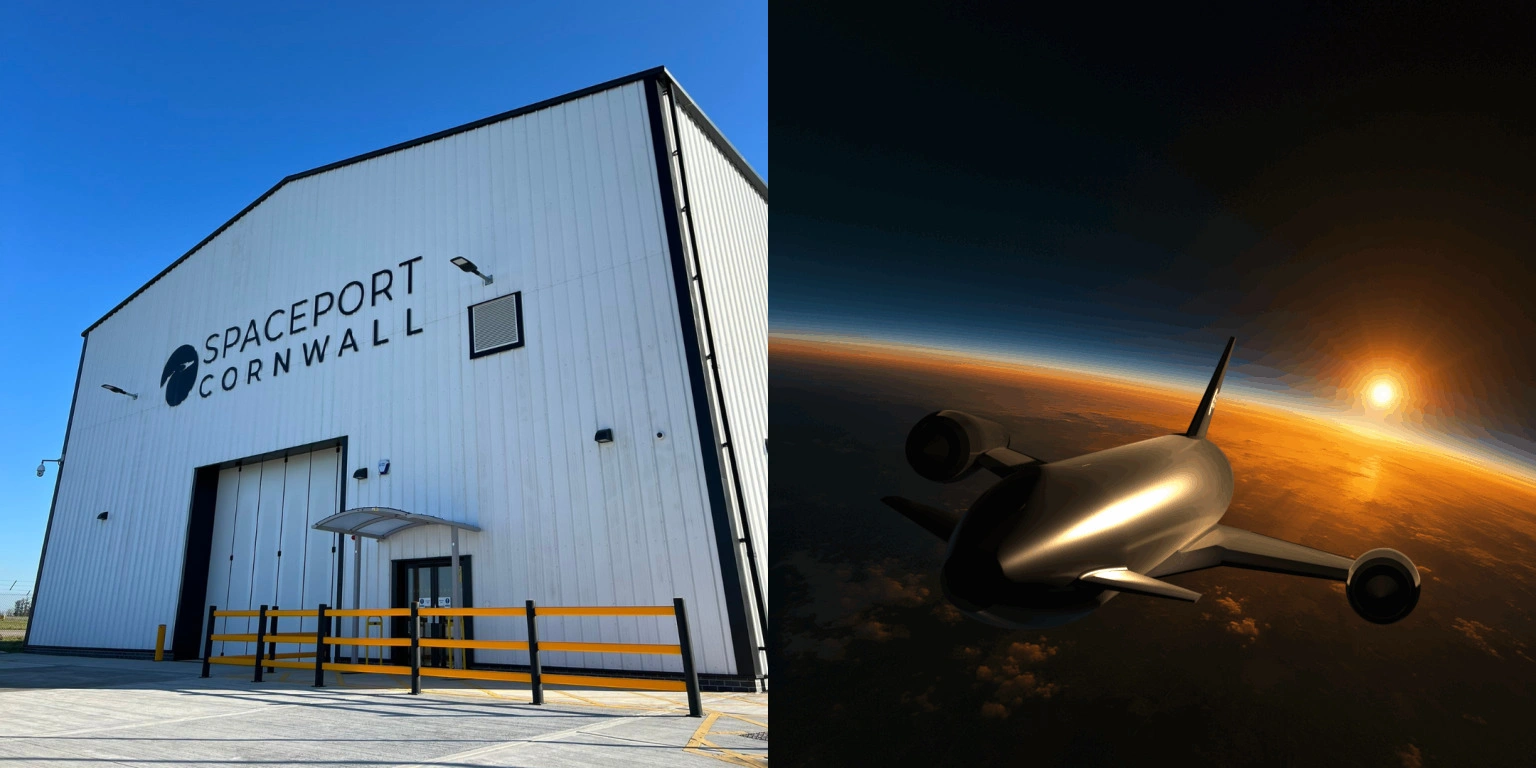Superfast train network dubbed ‘Metro for Europe’ on track for 2040

John E. Kaye
- Published
- News
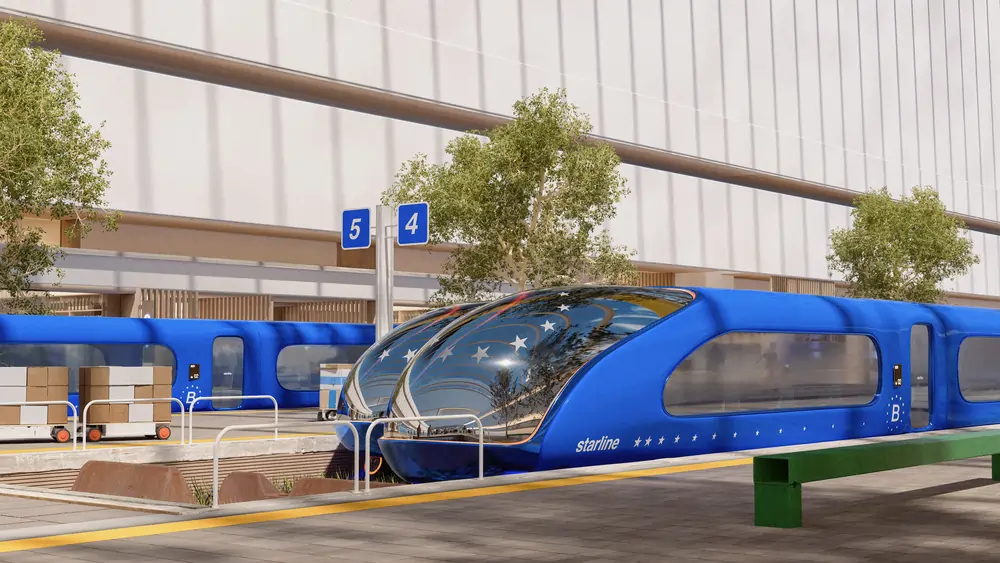
Plans have been revealed for a superfast train network which could revolutionise travel across the continent
Starline, dubbed the ‘Metro for Europe’, promises to cut journey times and link 39 cities with cheap fares, fewer delays, and comfortable seating.
The “ambitious” network would run on a fleet of new carriages carrying passengers between “major economic centres” at speeds of between 300kph and 400 kph – 30% faster than existing trains.
New “landmark” stations would be built across the 22,000km-long Metro-style grid, according to design blueprints by 21st Europe, a Copenhagen-based think tank.
The project – powered by renewable energy sources – is the “best chance” for Europe to meet its 2050 net-zero goals, it said.
Trains would run on a single European timetable to make “travel across Europe not just faster, but better”.
And tickets would operate on a similar purchase system to airlines, where passengers could either buy directly through Starline or book through a variety of other, potentially cheaper, platforms.
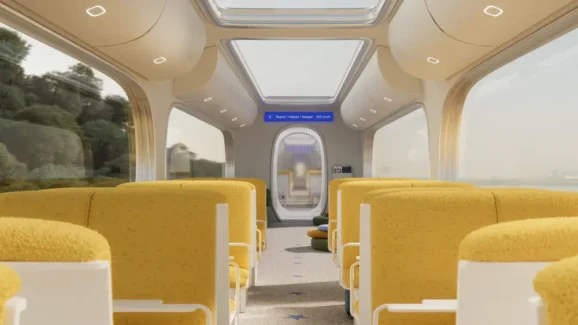
“Crucially, this is not about centralising sales under a single operator but about standardising access to rail travel across Europe, removing the friction that currently drives passengers to other modes of transport”, 21st Europe said.
Prices would also be “significantly” cheaper than short-haul flights and existing rail services to encourage “mass adoption”.
“Ultimately, the goal is not to maximise profit but to make high-speed rail the default choice for European travel,” 21st Europe added.
The deep blue trains, designed by Bakken & Bæck, will mimic the EU flag, with stars running along the sides of the carriages and bright yellow interiors.
It plans to make the trains as recognisable as red double-decker buses in London or yellow taxis in New York.
Unlike traditional trains, Starline will not have first or second-class seating. Instead, all the chairs are designed for “comfort over distance”, ensuring that “even the longest trips feel natural rather than exhausting”.
The network would be funded by the EU to ensure it becomes a “shared European asset” and overseen by a new European Rail Authority (ERA)—a proposed body within the EU framework responsible for ensuring the system’s coordination, interoperability, and long-term expansion.
Under the blueprint, entitled ‘A High-Speed Future for Europe’, five lines would criss-cross the continent by 2040.
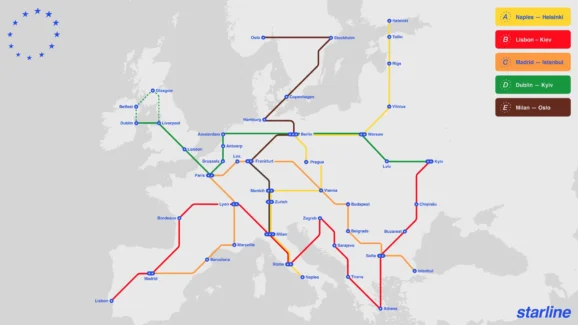
One would take passengers from the south to the north of Europe – Naples in the south of Italy to Helsinki in Finland. A second would travel the width of the continent, from Lisbon, Portugal, to Kyiv, Ukraine.
A third connects Madrid with Istanbul, while a fourth stretches from Dublin, Ireland, to Kyiv, Ukraine. The fifth line spans Milan, Italy, to Oslo, Norway.
According to 21st Europe, the journey from Helsinki to Berlin – currently a full-day trip – would take just over five hours.
It added: “Railways have never been just about transport. They are lines drawn through history and society. Starline is about redrawing them—not to divide, but to connect. To make a continent feel whole again.
“Starline is an invitation to rethink how Europe moves. This blueprint is not just a proposal for high-speed rail—it’s meant to ignite conversation, a starting point for reimagining connectivity across the continent.
“Now, we begin building the network to push for real change, bringing together policymakers, designers, and industry leaders to turn vision into action.
“But just as much as it is about infrastructure, Starline is about ideas. 21st Europe exists to spark these discussions, and anyone who shares this ambition can join as a member—to contribute, debate, and help shape the future of mobility in Europe.”
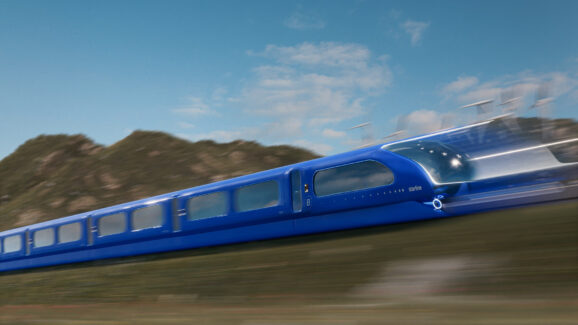
Images: 21st Europe
RECENT ARTICLES
-
 Strong ESG records help firms take R&D global, study finds
Strong ESG records help firms take R&D global, study finds -
 European Commission issues new cancer prevention guidance as EU records 2.7m cases in a year
European Commission issues new cancer prevention guidance as EU records 2.7m cases in a year -
 Artemis II set to carry astronauts around the Moon for first time in 50 years
Artemis II set to carry astronauts around the Moon for first time in 50 years -
 Meet the AI-powered robot that can sort, load and run your laundry on its own
Meet the AI-powered robot that can sort, load and run your laundry on its own -
 Wingsuit skydivers blast through world’s tallest hotel at 124mph in Dubai stunt
Wingsuit skydivers blast through world’s tallest hotel at 124mph in Dubai stunt -
 Centrum Air to launch first European route with Tashkent–Frankfurt flights
Centrum Air to launch first European route with Tashkent–Frankfurt flights -
 UK organisations still falling short on GDPR compliance, benchmark report finds
UK organisations still falling short on GDPR compliance, benchmark report finds -
 Stanley Johnson appears on Ugandan national television during visit highlighting wildlife and conservation ties
Stanley Johnson appears on Ugandan national television during visit highlighting wildlife and conservation ties -
 Anniversary marks first civilian voyage to Antarctica 60 years ago
Anniversary marks first civilian voyage to Antarctica 60 years ago -
 Etihad ranked world’s safest airline for 2026
Etihad ranked world’s safest airline for 2026 -
 Read it here: Asset Management Matters — new supplement out now
Read it here: Asset Management Matters — new supplement out now -
 Breakthroughs that change how we understand health, biology and risk: the new Science Matters supplement is out now
Breakthroughs that change how we understand health, biology and risk: the new Science Matters supplement is out now -
 The new Residence & Citizenship Planning supplement: out now
The new Residence & Citizenship Planning supplement: out now -
 Prague named Europe’s top student city in new comparative study
Prague named Europe’s top student city in new comparative study -
 BGG expands production footprint and backs microalgae as social media drives unprecedented boom in natural wellness
BGG expands production footprint and backs microalgae as social media drives unprecedented boom in natural wellness -
 The European Winter 2026 edition - out now
The European Winter 2026 edition - out now -
 Parliament invites cyber experts to give evidence on new UK cyber security bill
Parliament invites cyber experts to give evidence on new UK cyber security bill -
 EU sustainability rules drive digital compliance push in Uzbekistan ahead of export change
EU sustainability rules drive digital compliance push in Uzbekistan ahead of export change -
 AI boom triggers new wave of data-centre investment across Europe
AI boom triggers new wave of data-centre investment across Europe -
 Lammy travels to Washington as UK joins America’s 250th anniversary programme
Lammy travels to Washington as UK joins America’s 250th anniversary programme -
 China’s BYD overtakes Tesla as world’s largest electric car seller
China’s BYD overtakes Tesla as world’s largest electric car seller -
 FTSE 100 posts strongest annual gain since 2009 as London market faces IPO test
FTSE 100 posts strongest annual gain since 2009 as London market faces IPO test -
 Five of the biggest New Year’s Eve fireworks happening tonight — and where to watch them
Five of the biggest New Year’s Eve fireworks happening tonight — and where to watch them -
 UK education group signs agreement to operate UN training centre network hub
UK education group signs agreement to operate UN training centre network hub -
 Cornwall project to open new UK test airspace for drones and autonomous aircraft
Cornwall project to open new UK test airspace for drones and autonomous aircraft

























